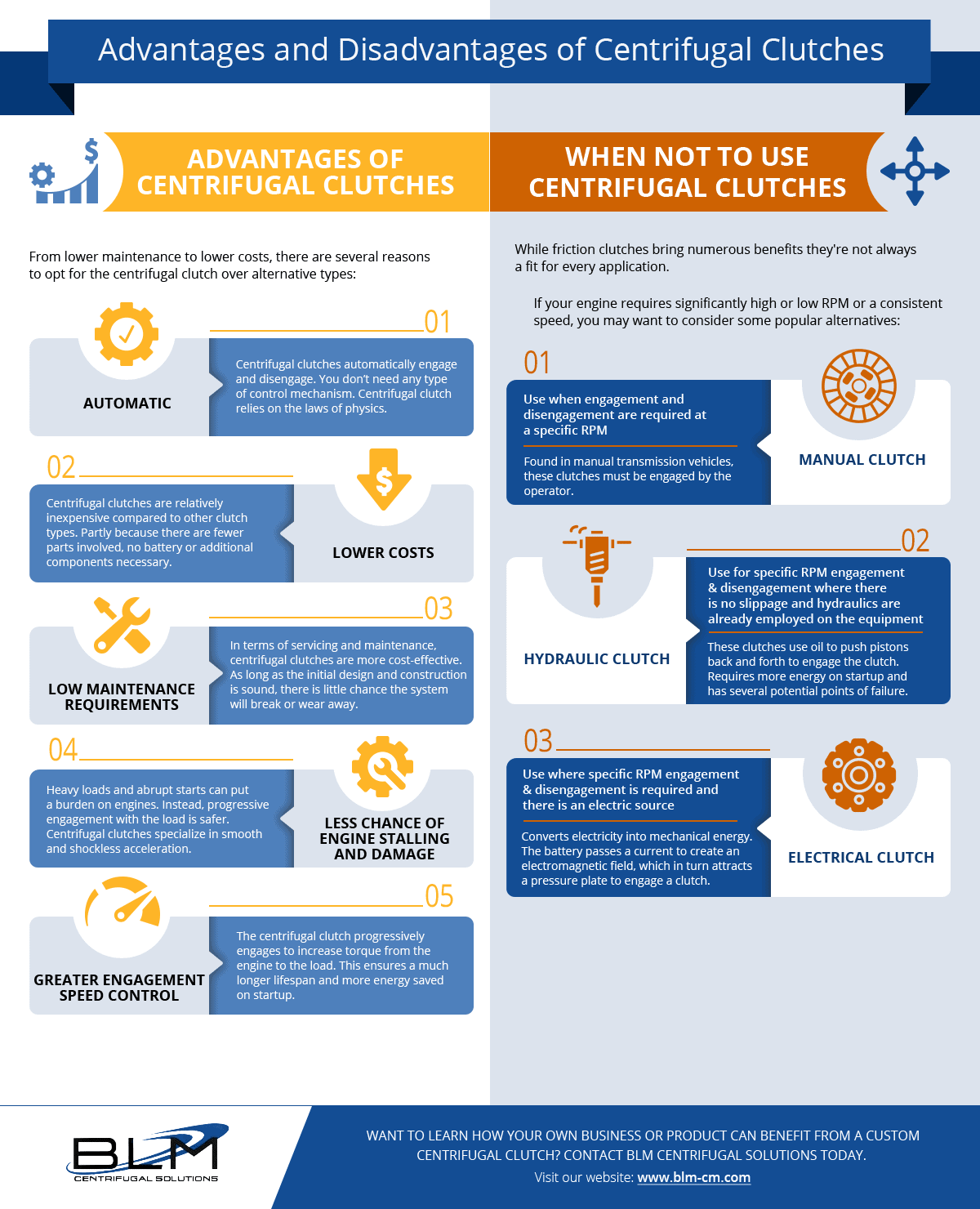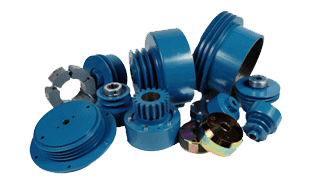Centrifugal clutches transfer rotational power from the power source (e.g., an engine, motor, or turbine) to the intended load for acceleration. These devices employ centrifugal force to safely transfer energy from the power source’s shaft to the drive shaft or transmission without stalling or causing damage to the mechanical equipment.
BLM Automatic Clutch produces custom centrifugal clutches designed to power industrial equipment. With 87 years of designing and manufacturing high quality clutches for industrial, military, public, and chemical applications, we have the knowledge and expertise to provide the optimal clutch for your equipment.
Custom Centrifugal Clutches vs. Manual, Hydraulic, and Electrical
There are many types of clutches available to connect prime movers, such as motors and engines, to loads and equipment. They can be designed and constructed to have various sizes, construction materials, or special features, as well as employ different mechanisms to connect to a load or a piece of equipment. These differences enable centrifugal clutches to provide certain advantages over other types of clutches, including manual, hydraulic, and electric clutches.
How a Centrifugal Clutch Operates: Read the Blog
Advantages of Centrifugal Clutches
There are quite a few advantages of centrifugal clutches, especially for extending the life of the connecting equipment.

Centrifugal clutches are simple parts that can be easily installed, monitored, and replaced as needed. The parts are also available in customized design, so the complexity of any system can be handled without the need for additional parts or mechanisms. Centrifugal clutches are commonly used by small-motor industries because they offer a wide range of benefits, including:
- Low maintenance requirements. The simplicity of the centrifugal clutch design facilitates servicing and maintenance operations. Once the part design has been tested to ensure a proper fit for the engine’s power and the load’s force requirements, it can perform with little wear or breakage.
- Automatic operation. The clutch mechanism operates automatically without the need for manual operator control, which saves time in preventing engine stall or damage.
- Automatic engagement and disengagement. Centrifugal clutches do not need separately powered and fallible systems.
- Lower costs. As these clutches use the centrifugal forces that are already generated by the prime mover, facilities do not need to invest in additional power sources or components. Centrifugal clutch components themselves are also low cost once the design is prototyped and finalized.
- Greater engagement speed control. Smooth engagement is an important part of extending any machinery’s lifespan. To smooth the delivery of power, clutches progressively engage to gradually increase the torque from the engine to the load or transmission.
- Reduced risk of engine stalling and engine damage. Sudden starts, heavy loads, and overloading put unnecessary stress on engines and motors. They perform better when they can progressively engage with heavy equipment. Centrifugal clutches provide this buffer from shock and immediate overload by allowing the motor to get to a controlled point of operation before connecting to the load.
- Smoother acceleration operations. These clutches can provide smoother acceleration with less shock.
- Starting capabilities without load. These clutches enable prime movers to operate without an initial load.
- No requirement for expensive starting equipment.Other clutches require safety guards or additional equipment to protect the motor and fragile parts during startup, but centrifugal clutches do not engage with the transmission until sufficiently powered.
- Automatic slippage to protect the engine.Overloads can make engines stall and put a lot of wear on the parts over time. Centrifugal clutches slip automatically without manual overrides and disengagements that other clutches often require.
- Potential use with small motors.Because the motor does not immediately have to generate enough power to engage with the transmission or load, it can be smaller. The motor can power up through progressive stages, contributing to their lower startup energy cost.
View Our Catalog of Custom Centrifugal Clutches CAD Drawings
Centrifugal Clutches vs. Manual Clutches
Manual clutches are commonly found in manual transmission passenger and industrial vehicles. These clutches rely on the operator to engage the clutch, act to prevent problems and slippage, and maintain awareness of wear on the clutch and motor.
Manual clutch systems may include two different components of operation that centrifugal clutches do not need:
- Dog and spline clutches:These systems lock together and are susceptible to grinding and breakage along the teeth. They also require manual control to engage and disengage. While not every manual clutch is a dog and spline clutch, they are the most common type.
- Clutch pedal:Clutch pedals are manual pedals that are pressed and released to engage and disengage the shaft to the driving mechanism of the load or transmission.
Centrifugal Clutches vs. Hydraulic Clutches
Hydraulic clutches use pressurized oil to move pistons back and forth to engage or disengage the clutch. A pump powered by the prime mover releases oil from a reservoir to an accumulator and a control valve. The control valve allows the fluid to engage the pistons or return to the reservoir as needed.
Compared to centrifugal clutches, these clutches require more energy on startup and have multiple points of potential failure. They also require constant maintenance to prevent leaks and fluid loss.
Centrifugal Clutches vs. Electrical Clutches
Electrical and electromagnetic clutches use an electrical power source that converts electricity into mechanical energy to transmit torque. A battery passes an electric current through windings to produce an electromagnetic field. This field attracts a pressure plate, moving it to engage the clutch. To disengage the clutch, the battery shutoffs to dissipate the electromagnetic field.
The energy used to activate this clutch turns into heat, which can quickly overheat an engine. Although some electromagnets are insulated, reducing the risk of overheating, it also limits the amount of torque the field can provide. Centrifugal clutches, on the other hand, are designed to prevent overheating and do not have this design limitation.
Applications of Centrifugal Clutches
Typical applications of centrifugal clutches in small motor industries include chainsaws, rental equipment, saw mills, compressors and construction equipment.
Common applications across these industries include the following equipment and machinery:
- Brake drums
- Centrifuges
- Chippers
- Compressors
- Concrete pumps
- Conveyors
- Crushers
- Curbers
- Deep well pumps
- Diesel engines
- Earth augers
- Fans
- Mixers (including mortar mixers)
- Pumps
- Rotary kilns
- Sand
- Portable band saws
- Swedges
- Sweepers
- Tampers
- Textile equipment
- Power Trowels
- Truck refrigeration
Finding Centrifugal Solutions
Centrifugal clutches play a critical role in driving torque and protecting prime mover equipment and systems across a wide range of industries.
At BLM Automatic Clutch, we have been a custom centrifugal clutch manufacturer for over 85 years with capabilities for designing, modifying, and constructing centrifugal clutches with short lead times. We also have experience with public and military contracts to create specialized centrifugal clutches that work in extreme conditions. Specifically, we have a long history of manufacturing custom centrifugal clutches for the:
- Agriculture/Forestry industry
- Chemical industry
- City waterworks industry
- Military defense industry
- Mining industry
- Public works industry
Our custom centrifugal clutches are ISO 9000 compliant and available in prototype, small, and large runs with options for painted or electroplated finishes based on customer request. We also offer maintenance and repair services and warranties for all products we manufacture. With just two to three weeks of lead time, we can supply centrifugal clutches that are tailored to the specific requirements of your application.
Request a Quote from BLM Automatic Clutch
Centrifugal clutches are simple, safe solutions for providing torque and power from an engine or motor to a transmission and load. As a custom centrifugal clutch supplier, BLM Automatic Clutch designs and customizes services unmatched by any other clutch manufacturer. We stand by the quality and longevity of our centrifugal clutches with long term manufacturer support and warranties.
Contact us today with the details of your project to receive a quote.
Custom Centrifugal Clutch Highlights
Project Name
Centrifugal Clutches
Combinations
Coupling
Flywheel
Universal Shaft
Pulley
Soft Start
Custom Designs
Coupling Combinations Shaft to Shaft In-Line Mounting
Close Shaft Mounting (Type A)
Gap Mounting (Type B)
Gear Coupling (Type GMG)
Flywheel Combinations Engine Flywheel Mount
Direct Coupling (Type C)
Universal Shafts (Type FMU)
Flexible Element (Type PMH)
Universal Shaft Combinations Engine (or Motor) Shaft Mount
Integral Sheave (Type F)
Timing Pulleys
Step Pulleys
Single Pulleys
Double Pulleys
Flywheel Mounted
Soft Start Combinations
Double “C” Flange
Metric “D” Flange
Power Source
Electric Motor
Gas / Diesel Engine
Power
1 to 3,000 HP
Rotational Speed
600 to 3600 RPM
Idle Speed
800 to 2,000 RPM
Materials
Cast Iron
Ductile Iron
Steel
Finish
Paint
Electroplating
Diameter
3 to 30 in
Weight
Up to 1,000 lbs.
Inspection
Dimensional
Additional Services
Repair
Maintenance
Warranty
Production Volume
Prototype
Small Runs
Large Runs
Typical Lead Time
2 to 3 weeks
Inspection
Dimensional
Additional Services
Repair
Maintenance
Warranty
Production Volume
Prototype
Small Runs
Large Runs
Typical Lead Time
2 to 3 weeks
Additional Information
Industry Focus
Industrial
Commercial
Agricultural
Pulp and Paper
Mining
Construction
Rental
Intended Applications
Chippers
Tampers
Concrete Pumps
Mortar Mixers
Conveyors
Truck Refrigeration
Crushers
Fans
Deep Well Pumps
Centrifuges
Brake Drums
Textile Machinery
Compressors
Diesels
Swedges
Earth Augers
Sand
Mixers
Pumps
Rotary Kilns
Saws
Trowels
Industrial Sweepers
Curbers
Industry Standards
ISO Compliant
Canadian Federation of Independent Business (CFIB)

 800.268.4295
800.268.4295

